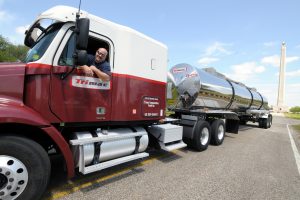At Trimac, “service with safety” is more than a motto. A solid safety culture is the company’s core.
Jack McCaig launched Trimac Transportation (then known as McCaig Cartage) in 1932 in Moose Jaw, Saskatchewan. Since then, while the company has transformed many times, it has maintained its family roots, being led by the McCaig family and Jack’s three sons, Bud, Roger, and Maurice. Today, the company has grown to become the leading bulk carrier in North America. Trimac fills a niche within the trucking sector, transporting the raw materials to make the goods we all need and want.
To say that safety is important to Trimac would be an understatement; Alex Guariento, VP Safety, describes the company’s safety culture as “a marathon” of learning. Everyone at the company is empowered by Trimac’s safety commitments:
describes the company’s safety culture as “a marathon” of learning. Everyone at the company is empowered by Trimac’s safety commitments:
- I make safety a part of every decision
- I make safety personal
- I have the courage to intervene
These three simple statements are powerful because they set individuals up for safety success.
While safety has always been important, an accident in 2018 compelled a conscious safety program. A tanker explosion at a facility in Newfoundland prompted many questions about how it happened, but more importantly, how the company let it happen. Fortunately, no one was injured and the Trimac leadership realized safety needed to be prioritized better to reduce situations where accidents could happen.
That incident was the main driver behind Trimac’s Rooted in Safety program. Guariento notes that it’s not a set of rules or policy book dictating from the top down; rather, it is a learning culture that promotes proactive safety practices to engage everyone from the ground up. Year over year, it has resulted in significant accomplishments, such as earning the National Tank Truck Carriers (NTTC) Competitive Safety Award three times; the prestigious award recognizes the best safety program and record for the year by a tank truck operator in North America.
Every aspect of the company’s work is part of its safety culture, including scheduling, tools, procedures, and behaviours. A person working safely is recognized.  A mishap is an opportunity to learn. People watch out for each other. Drivers are integral to Trimac’s safety record as they take their safety culture on the road; they are mindful of their own and clients’ safety. Their empowerment within the company has helped them support clients when unsafe practices have gone unnoticed because a long-standing process was never questioned. The result has been risk reduction in their own and clients’ facilities.
A mishap is an opportunity to learn. People watch out for each other. Drivers are integral to Trimac’s safety record as they take their safety culture on the road; they are mindful of their own and clients’ safety. Their empowerment within the company has helped them support clients when unsafe practices have gone unnoticed because a long-standing process was never questioned. The result has been risk reduction in their own and clients’ facilities.
Guariento says communication drives Trimac’s safety culture; at home, toolbox talks, bulletins, monthly meetings, and everyday opportunities for discussion help staff stay safety-aware. For drivers on the road, onboard tech connects drivers to supervisors and safety videos allow drivers to keep up with the company’s in-house training program, which includes Safety Tune-ups—short safety videos that drivers can watch at day’s end or while their truck is being unloaded. Regular safety communiques cover every aspect of Trimac’s work.
Drivers of bulk carriers log lots of time away. Trimac encourages drivers to use the Headversity app, which supports mental health by focusing on mindfulness. Managers keep an eye out for behaviour that could signal someone is struggling.
During the pandemic, as Area Manager Besnik Gasi notes, Trimac “doubled down on communication” to keep everyone—drivers, mechanics, loaders, office staff—safe. They established a pandemic response committee to oversee daily updates, PPE purchasing for all locations, best practices for physical distancing and sanitizing, and how to minimize contact with shippers and delivery locations. The technology already in place supported new processes, such as scanning documents from in-cab computers to minimize contact with others, and helped office staff transition to working remotely.
They held virtual safety meetings and training. They partnered with customers to ensure driver safety and establish mutual solutions to follow COVID guidelines on-site, which included allowing washroom and shower access for drivers. There has been a silver lining to the pandemic; Gasi notes experiencing the “uncertainties of the pandemic with minimal face time has brought teams closer and they’ve been able to leverage technology to fill gaps and operate safely in the communities they serve.”
Trimac is a good place to work, as evidenced by being named a Top Fleet Employer in 2021 and a Top Company for Women to Work For in Transportation four years in a row (2018 – 2021). Trimac supports Women Building Futures (WBF) and Women in Trucking (WiT).  They also support a women’s Youth Apprenticeship Program and have an active Diversity, Inclusion, Equity, and Belonging council that educates and engages teams on the issue. Their policies regarding women and a diverse workforce are particularly important today, given the commercial driver shortage.
They also support a women’s Youth Apprenticeship Program and have an active Diversity, Inclusion, Equity, and Belonging council that educates and engages teams on the issue. Their policies regarding women and a diverse workforce are particularly important today, given the commercial driver shortage.
Trimac became COR-certified in Alberta in 2004 and in BC in 2014; the company is COR-certified as a large employer.